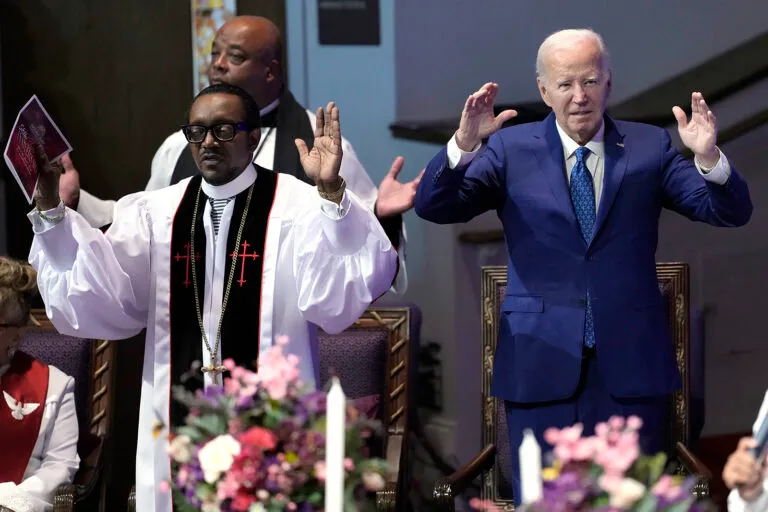In the wake of President Joe Biden’s controversial debate performance against former President Donald Trump, there is a palpable shift among Black churchgoers, a traditionally supportive constituency for Biden. While many remain steadfast in their support, others are beginning to question his candidacy and the future of his presidency.
A Mixed Reaction from Black Churches
On July 7, at a campaign event in Philadelphia, Bishop J. Louis Felton of Mount Airy Church of God in Christ openly endorsed President Biden. With Biden present, Felton led his congregation in a fervent display of support, praying for Biden’s strength and renewal. The mood was one of enthusiastic backing, with church members chanting “four more years” in response to Biden’s praise of Black church faith.
However, this support contrasts with growing concerns within other segments of the Black church community. The Rev. Karl Anderson of Gainesville, Florida, reported receiving messages of disillusionment from his congregation, reflecting a broader unease among some Black churchgoers. Despite the biblical injunction against despair, Anderson’s communications reveal a significant level of apprehension regarding Biden’s performance and future prospects.
Polling Data and Shifting Attitudes
Recent polling data underscores the complexity of the situation. A survey conducted by Pew Research Center from July 1-7 shows that if faced with a choice between Biden and Trump, 50% of voters would support Trump, compared to 47% for Biden. Among Black voters, Biden maintains a significant lead with 64% support compared to Trump’s 13%. However, this represents a narrowing of Biden’s previous advantage and highlights the growing discontent within the Black community.
The survey also indicates a split within Protestant denominations. While overall Protestant support favors Trump, Black Protestants, including those from historically significant denominations like the Church of God in Christ, show stronger backing for Biden. This split reflects the broader trend of wavering support for Biden among Black churchgoers, particularly following his debate performance.
Denominational Differences and Voter Sentiment
Jason Shelton, a scholar of Black church dynamics, notes that support for Trump among Black nondenominational Protestants is notably higher compared to other Black Protestant groups. This trend is evident before and after the debate, with a segment of Black voters expressing ambivalence about Biden.
Despite these concerns, prominent events and appearances by key figures like Vice President Kamala Harris and Biden himself could influence the mood within Black churches. R. Khari Brown, a sociologist at Wayne State University, suggests that focusing on domestic issues such as job creation and criminal justice reform may be crucial for reinforcing Biden’s support among Black churchgoers.
Historical and Policy Context
Historically, Black church leaders have been influential in shaping political discourse within their communities. Figures such as Jacquelyn Dupont-Walker of the African Methodist Episcopal Church and Bishop Lawrence Reddick of the Christian Methodist Episcopal Church emphasize that Biden’s debate performance is not the sole determinant of support. They point to Biden’s achievements, including health care reforms and the nomination of the first Black woman to the Supreme Court, as significant positives.
Bishop Reddick, in particular, relates Biden’s debate struggles to his own experiences of fatigue and challenges, suggesting that a single poor performance does not overshadow Biden’s broader contributions and commitments.
Challenges and Future Directions
Despite Biden’s achievements, some Black church leaders express disappointment and caution. Rev. W. Franklyn Richardson, chairman of the Conference of National Black Churches, acknowledges Biden’s accomplishments but also highlights ongoing issues that might impact voter enthusiasm. Richardson and others argue that while Biden’s record is strong, the broader political landscape and Trump’s controversial positions also play a role in shaping voter sentiment.
The ongoing Israeli-Hamas conflict and its impact on global perceptions are also a concern, though leaders like Richardson believe it will not decisively sway Black churchgoers’ votes.
Conclusion
The debate performance has undeniably sparked a range of responses among Black churchgoers. While many continue to support Biden, there is an emerging undercurrent of doubt and critique. For Biden, the path forward may involve more focused engagement with domestic issues and direct communication with Black communities to solidify support and address emerging concerns.
FAQ
1. How did Black churchgoers react to Biden’s debate performance? Reactions are mixed. While some, like Bishop J. Louis Felton, remain enthusiastic in their support, others, such as Rev. Karl Anderson, report growing concerns and doubts among their congregations.
2. What does recent polling data indicate about Biden’s support among Black voters? Recent polls show Biden leading Trump among Black voters, with 64% supporting Biden compared to 13% for Trump. However, this support is not monolithic and reflects a narrowing advantage for Biden.
3. How do different Black Protestant denominations view Biden? Support for Biden varies among denominations. Black nondenominational Protestants are more likely to support Trump compared to Black Methodists, Baptists, and Holiness Pentecostals, who generally show stronger support for Biden.
4. What are some of Biden’s achievements that are highlighted by Black church leaders? Biden’s achievements include health care reforms, historic low levels of Black unemployment, and the nomination of Ketanji Brown Jackson as the first Black woman to the Supreme Court.
5. How might upcoming events influence Biden’s support among Black churchgoers? Upcoming appearances by Biden and Vice President Kamala Harris at key Black church events could help address concerns and reinforce support by highlighting their commitment to domestic policies affecting the Black community.


